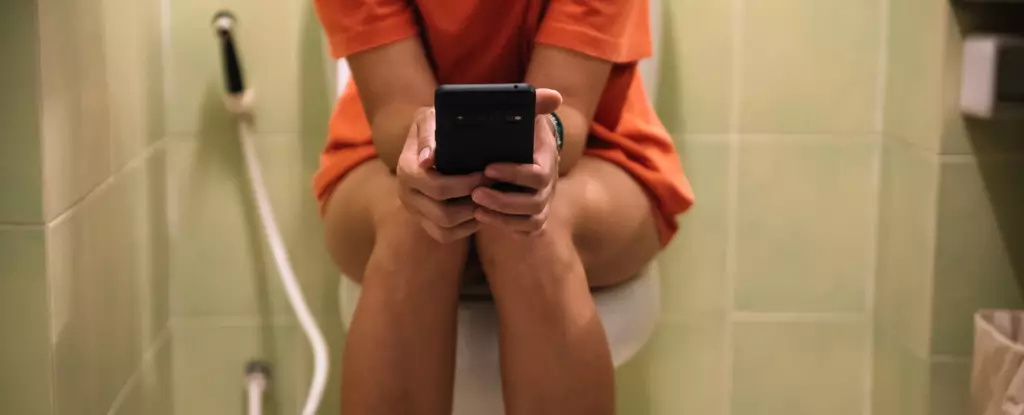In an age where multitasking reigns supreme, even our most private moments aren’t exempt from the clutches of technology. A startling trend has emerged: more and more people are turning their restrooms into tech portals, leading to an alarming rise in prolonged toilet visits. A recent survey revealed that those extending their stays on the porcelain throne due to smartphone use could face dire consequences, including a staggering 46% increased risk of developing hemorrhoids. While it might seem innocuous to scroll through social media or catch up on emails, what we’re actually doing is compromising our well-being—pitting convenience against health.
This phenomenon can be partly attributed to our relentless need for distraction. Sitting comfortably while reading a favorite article or watching viral videos seems harmless until you realize that the act of sitting for extended periods can be detrimental. The survey, presented at the Digestive Diseases Week (DDW) conference, highlights the disconnect between our pressing need to disconnect versus the risks we face when we don’t. When individuals are left to sit for more than 10 minutes—some even stretching it to over 6 minutes per visit—our bodies pay the price, leading us to question: what’s truly happening to our bodies while we scroll in sanctuary?
Understanding the Medical Landscape: Are We Ignoring the Warning Signs?
Hemorrhoids—a condition marked by swollen veins in the lower rectum—may seem like a bygone issue, often relegated to humor in late-night talk shows. Yet, the reality is far more serious, with nearly four million doctor visits in the U.S. attributing complaints to such ailments every year. This prevalence begs the question of why we’re still asking, “What causes hemorrhoids?” while our smartphones become fixtures in restrooms.
Currently, studies liken prolonged toilet sitting to conditions like hemorrhoids, yet the mechanisms behind these correlations are still as murky as the water beneath us. Are our smartphones simply the enablers of this act, or is there a deeper issue at play? From the findings presented by researchers at the Beth Israel Deaconess Medical Center, it seems we lack sufficient concrete data. The last national survey regarding hemorrhoids dates back to 1989—three decades ago—ignoring a tangible issue that’s ever-evolving alongside our lifestyles.
Studies indicate that the act of sitting, extended by the allure of smartphones, could weaken and dilate the very blood vessels that give rise to this pesky condition. Recommendations suggest curtailing toilet time to a mere 3 minutes, a luxury most of us have forsaken. Reflecting upon our current behaviors prompts us to wonder—why are we permitting technology to disrupt our health routines and fundamental biological processes?
The Cultural Habit: From Newspapers to Smartphones
“Reading on the toilet” isn’t a modern phenomenon. Historical anecdotes of newspaper usage as makeshift toilet paper paint a comical picture of past habits. However, we’ve entered a new era, one marked by the inescapable grip of smartphones. These devices don’t just entertain us; they engage our minds and capture our attention like nothing before them. Yet, this diversion shifts our focus away from what should be a brief, albeit essential, biological function—liberation from our bodily waste.
The implications of this shift in our habits raise significant concerns around what could be dubbed “toilet hygiene.” Researchers in recent studies are calling for the restroom—a sacred space designed for personal freedom—to be free from distractions. In many ways, the act of scrolling while seated distracts us not only from our bodily needs but from the more significant matter of self-care. With these pervasive habits on the rise, it’s crucial to instill awareness of how gadgets may inadvertently rob us of health while promising convenience.
Prioritizing Health Over Habit
There’s an absurdity in the notion that our digital habits are now dictating our bathroom routines. Our existence today thrives on instant gratification, often leading to the misprioritization of basic human needs. The latest research underscores the urgency of re-evaluating our bathroom routines. “Going number two” shouldn’t become a source of social media inspiration or a moment of digital entertainment but a necessary event for our bodies.
Realigning our mental focus back to our health can start with simple steps: reclaiming the restroom, setting boundaries, and making “toilet scrolling” a relic of the past. After all, it isn’t just about clearing our minds or engaging our fingers; it’s about listening to our bodies and treating them with the respect they deserve. Moving towards more mindful toilet habits could mean the difference between ongoing discomfort and a healthier, more balanced lifestyle.

Leave a Reply